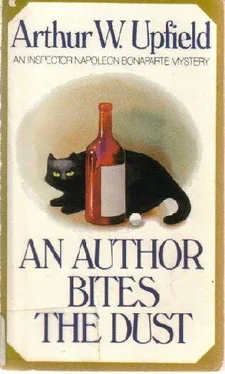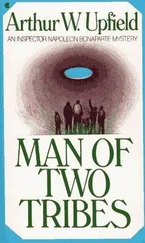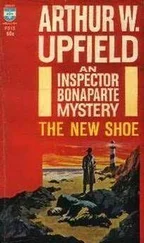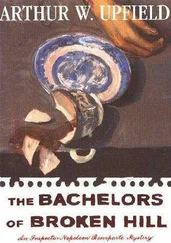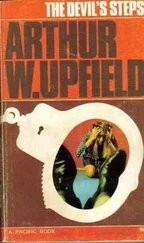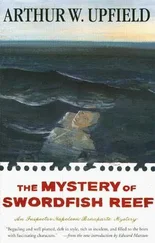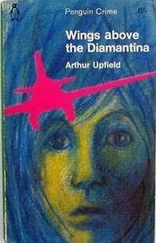Arthur Upfield - An Author Bites the Dust
Здесь есть возможность читать онлайн «Arthur Upfield - An Author Bites the Dust» весь текст электронной книги совершенно бесплатно (целиком полную версию без сокращений). В некоторых случаях можно слушать аудио, скачать через торрент в формате fb2 и присутствует краткое содержание. Жанр: Классический детектив, на английском языке. Описание произведения, (предисловие) а так же отзывы посетителей доступны на портале библиотеки ЛибКат.
- Название:An Author Bites the Dust
- Автор:
- Жанр:
- Год:неизвестен
- ISBN:нет данных
- Рейтинг книги:5 / 5. Голосов: 1
-
Избранное:Добавить в избранное
- Отзывы:
-
Ваша оценка:
- 100
- 1
- 2
- 3
- 4
- 5
An Author Bites the Dust: краткое содержание, описание и аннотация
Предлагаем к чтению аннотацию, описание, краткое содержание или предисловие (зависит от того, что написал сам автор книги «An Author Bites the Dust»). Если вы не нашли необходимую информацию о книге — напишите в комментариях, мы постараемся отыскать её.
An Author Bites the Dust — читать онлайн бесплатно полную книгу (весь текст) целиком
Ниже представлен текст книги, разбитый по страницам. Система сохранения места последней прочитанной страницы, позволяет с удобством читать онлайн бесплатно книгу «An Author Bites the Dust», без необходимости каждый раз заново искать на чём Вы остановились. Поставьте закладку, и сможете в любой момент перейти на страницу, на которой закончили чтение.
Интервал:
Закладка:
“Mervyn Blake was my friend. We had been friends for many years. What I took from his writing-room he gave to me some considerable time before he died. I took only what was mine, and I took it because Mrs Blake refused to give me what was mine. Mrs Blake never liked me. After her husband died, she never troubled to conceal her dislike.
“TheBlakes, you will know, often entertainedoversea authors. Some of them were widely travelled. The great majority were excellent raconteurs. At the end of an evening in the company of one of these visitors, Blake would record in a note-book the gist of the stories they told. In the course of years there were a great many anecdotes and queer stories entered into that note-book. Sometimes Mrs Montrose would record the stories and Blake would subsequently enter them in his book. On other occasions I would make the notes and afterwards give them to him.
“Not being a writer yourself, Inspector, you would not appreciate the great store of plots contained between the covers of that note-book. Blake at first intended to use them for short stories. Mrs Blake, in fact, did use a number of them. As I said just now, Blake gave them to me by promise. He did so repeatedly, and also he said he had bequeathed them to me in his will. Poor fellow, he put it off and put it off. I took what was my own.”
“Is there anyone who would support that contention?” asked Bony.
“Yes. Mrs Ella Montrose would support it. And so would Twyford Arundal, the Adelaide poet.”
“And you went to stay at the Rialto Hotel to seize the opportunity of taking those notes without the widow’s permission?”
“When I learnt that the note-book was not mentioned in Blake’s will, I wrote to Mrs Blake stating the facts,” Wilcannia-Smythe said. “She wrote in reply, saying that she knew nothing of any such intended bequest, and that she would not part with anything belonging to her husband. I went down to Warburton, put up at the hotel, and then travelled to Melbourne one day to visit Mrs Blake, who was staying with Ella Montrose. Mrs Blake was adamant. I returned by the evening train, alighting at Yarrabo. I saw the cook board the bus for Warburton, and knew she would be off to the cinema. So I went to the house, sat on the back veranda and waited until it was dark. One moment, I’m a little out of order. I committed an additional crime. I entered the house through the rear door, which the cook had left unlocked, and knowing where the spare key of the writing-room was kept, I took it, intending to replace it before the cook returned from the cinema.”
Bony eased himself in his chair.
“And the two men who tied you to a tree, who were they?” he asked.
“I don’t know.”
“They did remove the note-book and typescript from your effects at the Rialto Hotel, did they not?”
“Yes.”
“What was the typescript matter?”
“Notes intended for transference to the note-book.”
“Who else, do you think, might be interested in that notebook, other than yourself and Mervyn Blake’s widow?”
“A considerable number of people,” replied Wilcannia-Smythe. “In its way, the note-book housed quite a famous collection of anecdotes. It represented a gold mine for any writer.”
“And you think it probable that Mrs Blake persuaded a friend or two to get it back for her?”
“Yes. But who, I cannot tell you. I did not recognize the voice of the one man who spoke. I did not recognize either of them by their physical appearance. And I did not recognize the car.”
“Was there anyone staying at the Rialto who was well known to you?”
“No.”
“And you left the note-book-where?”
“In the larger of my suitcases.”
“Thank you. Now let us discuss another matter-the contents of the note-book. How much were you conversant with the contents?”
“Very little. The note-book contained a large number of stories told when I was not present.”
“So that the note-book could contain a story of coffin dust and you not know of it?”
“Undoubtedly.”
“Would Mrs Montrose be more familiar with the contents of the book?”
“Yes. And so would Mrs Blake. Ella Montrose was closer to Blake than I was. She was always with theBlakes when they had important people staying with them.” Wilcannia-Smythe frowned for an instant, and then added with greater warmth than hitherto displayed, “I believe I am not exaggerating when I say that all told there were close upon a thousand excellent stories in that book. Blake’s writing was exceedingly small. As I said just now, the book was a gold mine, more valuable as a gift to a writer than a thousand pounds. Blake intended giving it to me. I think I can find one or two of his letters in which he states that intention.”
“H’m! Still, Mr Wilcannia-Smythe, your actions in gaining possession of it were most reprehensible,” Bony said severely. “If Mrs Blake should prosecute, or report the loss, you will certainly find yourself in an unpleasant situation. However, I appreciate your candour. Now kindly assist me in another matter by throwing light upon several people well known to you. Dr Dario Chaparral visited Australia for the first time in 1936. He stayed with you for several days. Was he then interested in ping-pong?”
“No, not nearly to the extent that he was on his last visit.”
“How long prior to his first visit to Australia did you know him?”
“I heard of him about a year before,” Wilcannia-Smythe replied, “through theBlakes. They were corresponding with him for several years before 1936, and when he came to Australia on that occasion, they came to Sydney especially to meet him. Ella Montrose also came up from Melbourne.”
“Was the note-book employed at that time?”
Wilcannia-Smythe hesitated before answering.
“I’m not sure. I am inclined to think that it was.”
“Thank you,” Bony said. “Although you feel you cannot admit any knowledge of I. R. Watts-er-professionally, you must know, privately, something about him-where he lives, what he has done, other than his novels.”
The left extremity of Wilcannia-Smythe’s upper lip lifted in a sneer.
“When Watts first began to issue his tales, we examined them as a matter of course,” he said. “On finding that they could not be considered as a serious contribution to Australianliterautre, no one troubled about the fellow. He kept himself to himself. He made no advances, nor did he attempt to enter any literary circle. For years I have held the opinion that I. R. Watts is a pen-name of someone very well known in Australia, possibly someone in the political or religious spheres. We made no attempt to find out as we were never concerned with his work.”
“H’m! That’s a point of interest, Mr Wilcannia-Smythe,” Bony said, rising to his feet. “Why do you think that Mervyn Blake was murdered?”
“Why?” The grey eyes gleamed but the face remained calm, and almost expressionless. “I believe he was murdered because he was perfectly well when he went off to bed that night, and because of the way he looked when we discovered him the next morning. He had been in the hands of doctors for several years, and not long before he died he was overhauled by the Yarrabo doctor who found nothing wrong with his heart, and that even his ulcers were drying up.”
“Have you any thoughts of a motive for murdering him?”
“None. I’ve no doubt that Blake was heartily disliked by those who turn out commercial fiction and whom we could never recognize. He had no personal enemies that I knew of.”
“Do you think it probable that Mrs Blake instigated the successful attempt of getting back the note-book you-er-purloined?”
“No, I do not. And yet no one else knew I had taken it-excepting, perhaps, the Pinkney woman, or the person who seems to have informed you. Which reminds me, Miss Pinkney hated Blake for having tossed a stone at her cat.”
Читать дальшеИнтервал:
Закладка:
Похожие книги на «An Author Bites the Dust»
Представляем Вашему вниманию похожие книги на «An Author Bites the Dust» списком для выбора. Мы отобрали схожую по названию и смыслу литературу в надежде предоставить читателям больше вариантов отыскать новые, интересные, ещё непрочитанные произведения.
Обсуждение, отзывы о книге «An Author Bites the Dust» и просто собственные мнения читателей. Оставьте ваши комментарии, напишите, что Вы думаете о произведении, его смысле или главных героях. Укажите что конкретно понравилось, а что нет, и почему Вы так считаете.
